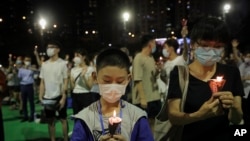Hong Kong’s legislature Thursday passed a controversial law to forbid ridicule of the Chinese national anthem amid widespread opposition.
The move came on the 31st anniversary of the crackdown on the Tiananmen pro-democracy movement, with activists defying a police ban to hold commemorations in a downtown park where a mass gathering has been held for 30 years.
The national anthem law passed shortly before 5 p.m. local time, with 41 voting for it and 1 voting against it, after pro-democracy lawmakers were ejected for staging a noisy protest. The law was passed quickly among largely pro-Beijing lawmakers while pro-democracy legislators shouted “A murderous state stinks forever” after the third reading of the bill resumed following a pause of four hours.
The chair of the session ordered a suspension around 1 p.m. local time after two pro-democracy lawmakers, Eddie Chu and Ray Chan, were ejected from the council chamber after staging a protest. They rushed to the front of the chamber holding placards and threw pungent liquid in protest and were led away quickly. They said earlier they would use any means to stop the national anthem bill from passing. Police who inspected the scene said they would not rule out arrests.
All of the 21 amendments raised by the pro-democracy lawmakers to limit the power of the proposed law were voted down earlier by the pro-Beijing lawmakers, who hold a majority in the legislature. Critics worried the broad definitions of terms like “insult” and “derogatory” in the law could curb freedom of expression in the city.
“We don’t want another weapon for the authorities to suppress Hong Kong people,” said Ray Chan, in the morning session.
“The kind of stability that is under draconian laws and severe punishment is soulless,” said Wu Chi-wai, chairman of the Democracy Party.
Under the new anthem law, offenses are punishable with a fine of $6,500 and up to three years in jail. The bill also mandates schools to include the anthem in their curriculum to teach students “the history and spirit of the national anthem.” The law prohibits behavior “insulting” or misusing the Chinese national anthem, including “publicly and intentionally” altering its lyrics or score, and playing or singing it in a “distorted or disrespectful way.”
The passage of the law came amid Beijing’s plans to impose sweeping national security laws on Hong Kong to prevent and punish “acts and activities” that threaten national security, including advocacy of secession, subversion and terrorism and foreign interference. China insisted that such laws were necessary to halt often violent anti-government protests in Hong Kong, which started a year ago. The movement was sparked by a controversial extradition law which could see individuals sent to mainland China for trial.
Tensions in the city persisted Thursday night, with Hong Kongers marking the June 4 anniversary of the military crackdown on the Tiananmen pro-democracy movement after police banned an annual candlelit vigil in the downtown Victoria Park that gone on uninterrupted for 30 years, citing COVID-19 concerns.
Thousands defied a police ban and thronged to downtown Victoria Park around 8pm. Unlike past years, there is no organized ceremony as police refused to give a permit.
People held candle lights and chanted slogans, but unlike past years when they called for the vindication of the 1989 pro-democracy movement, most were shouting slogans popular in the recent anti government movement, including ones calling for Independence.
Some of the chants included "Free HK, democracy now!,” and "Hong Kong Independence, only way!"
Some burst out singing the unofficial anthem of the anti government protests " Glory to Hong Kong.". Many people say this maybe the last Tiananmen vigil before the national security laws are implemented so they felt compelled to come out.
"They want to intimidate us, but I will not be scared. We have a responsibility to keep the memory alive. If we don't speak up then history will repeat itself, " saida 66 year old Mr. Cheung, referring to the 1989 crackdown.
"Tiananmen is meaningful because it showed the true face of the Communist Party. If we don't come out while we still can, we won't have another chance," said Kenneth, 26.
Chains and rails surrounded the vast sports grounds where some 180,000 people attended the commemoration last year - critics say the government used the disease as an excuse to keep the event from taking place as numbers of infections have been low.
In early evening, before the candle-lit vigil started, media tycoon Jimmy Lai and politicians including Lee Cheuk Yan, the head of the alliance, and Albert Ho - who were among the 15 pro-democracy figures arrested in April for illegal assembly - marched into Victoria Park.
"End to one party rule! Democracy in China now!" they chanted. People could be prosecuted for shouting these slogans once the national security laws are implemented in coming months.
Rowena He, author of Tiananmen Exiles: Voices of the Struggle for Democracy in China, and associate professor of history at the Chinese University of Hong Kong, said the banning of the vigil together with the two new laws “would have profound implications on Hong Kong”
But she said even after the military crackdown in 1989, “[mainland Chinese] people’s resistance have never stopped, even at the cost of freedom, personal happiness, and the future of their loved ones.”
“You cannot easily push people into darkness once they have experienced light. [Hong Kong] has been an open society with a strong civil society foundation,” she said. “The collective memory of lighting candles in Victoria Park will define the identity of not just people in Hong Kong, but global citizens who share the same humanity in our war of democracy against dictatorship. “





